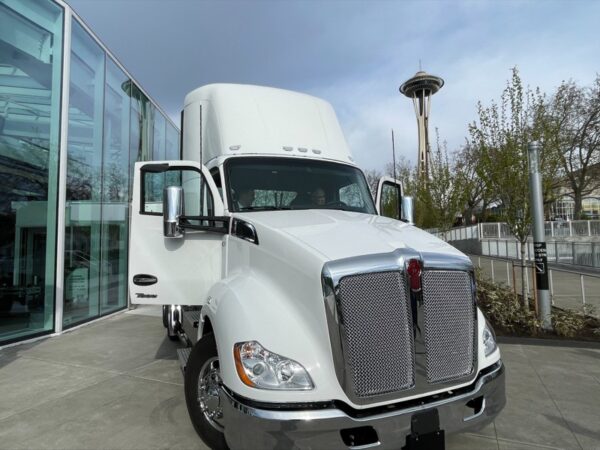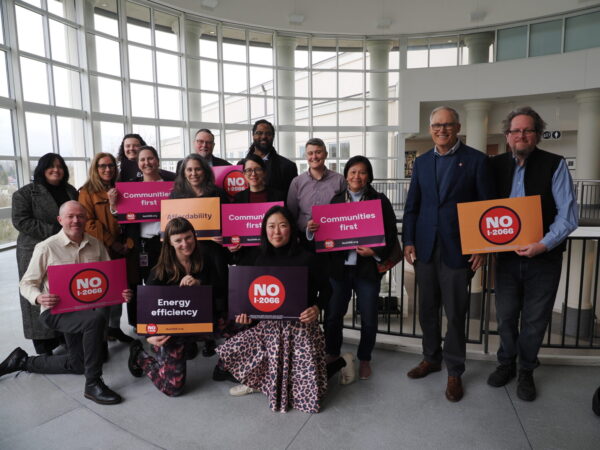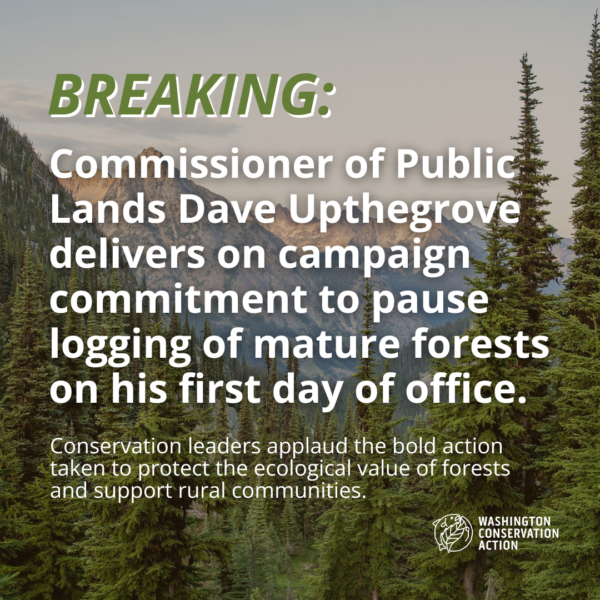Conservation groups respond to the ruling
For Immediate Release
THURSTON COUNTY, WA-Thurston County Superior Court Judge Anne Egeler affirmed that the Washington Department of Natural Resources (DNR) has the authority to lease lands for carbon sequestration. Doing so is consistent with the Department’s fiduciary obligations to trust beneficiaries. Conservationist groups welcomed Friday’s ruling. and their responses on this ruling are below.
Washington Conservation Action, Conservation Northwest, and the Olympic Forest Coalition intervened in this case to defend DNR’s leasing decision and to ensure that State law would continue to be interpreted to permit the best use of DNR’s forests.
The use of Washington’s older, carbon-dense public forests, and other management practices to help fight climate change took a huge step forward last week with this ruling.
The decision affirmed DNR’s authority and decision to lease a portion of its forested lands (up to approximately 10,000 acres, or 0.5% of the state’s 2 million acres of state forests) to carbon credit programs. DNR announced its modest leasing proposal in April 2022 and made its final decision to move forward with carbon leasing in Fall 2022.
The timber industry and two counties, Lewis and Skagit, immediately filed a lawsuit seeking to prevent the carbon credit leasing program from moving forward on the grounds that the identified forests were slated to be logged and that the state could not alternatively choose to generate revenue for these lands through a carbon credit leasing program. Plaintiffs argued that all “operable acres” of State-managed forests are legally required to be logged above all other uses.
Conservation Groups responses:
“Judge Egeler’s ruling gives DNR unambiguous authority to proceed with the agency’s proposed carbon project,” said Rachel Baker, Forest Program Director, Washington Conservation Action. “Carbon projects are one tool to deliver environmental, social, and economic benefits, and provide communities with predictable revenue alongside public value. We are celebrating that this new approach on 10,000 acres opens the door to managing forests for carbon and climate across the broader 2 million acres DNR manages. Managing forests for carbon and climate must be part of the future of managing our public state lands.”
Connie Gallant, Board President of the Olympic Forest Coalition said, “the Court’s decision to recognize the Department’s authority to take the next step in its modest carbon pilot project goes some measurable way towards affirming Washington’s constitutional requirement to manage our public lands in the interest of “all the people”. The case is about a much-needed tool for the public resource agency with authority to work toward environmental justice for essential services in rural communities – where both the environment and the people matter in the face of climate disruption. We welcome the Court’s decision and urge the Department to move rapidly to develop the carbon project. We are well past time to implement measures like this to protect our older, carbon-dense forests.”
“Our public lands can be managed to meet the public’s interest,” said Mitch Friedman, Executive Director of Conservation Northwest, based in Seattle. “This ruling reinforces the historic 2022 decision by the State Supreme Court in Conservation NW et al. v. Franz. The state constitution’s plain language that these lands are to be managed for ‘all the people’ gives DNR the obligation and discretion to balance the interests of the public with those of the trust beneficiaries.”
In an oral decision that will soon be summarized in a written order, the Court rejected the county and industry’s argument in total. The Court held:
- DNR’s leasing decision was within its general authority to manage, sell, or lease state lands for a myriad of purposes and in furtherance of what DNR concludes is in the best interest of the trusts and general public;
- DNR went about its environmental analysis of its carbon credit program in the right way under the State Environmental Policy Act (SEPA). DNR was within its discretion to determine that conserving trees for carbon sequestration as opposed to logging would not have a probable significant adverse environmental impact.
“Judge Egeler’s ruling undermines the false narrative that the timber industry has been pushing regarding carbon science and the Supreme Court ruling in CNW v. Franz,” said Paula Swedeen, Ph.D., Conservation Northwest’s Senior Director for Policy. “DNR has great flexibility to manage our public forests for both income and the public good. Protecting older forests for their carbon and biodiversity is certainly in the vital interest of the public.”
###
Media Contacts:
Zachary Pullin, Communications Director, Washington Conservation Action, zachary@waconservationaction.org, 206-639-3760
Andrea Wolf-Buck, Conservation Northwest Communications Director, andrea@conservationnw.org, 510-295-3579
Your donation ensures a sustainable future.



